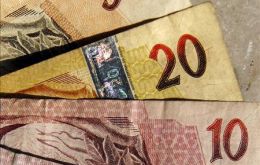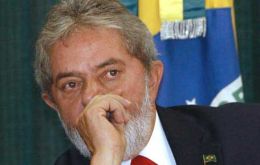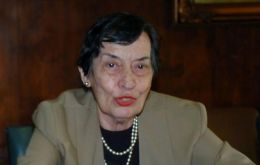MercoPress. South Atlantic News Agency
Tag: Brazil
-
Tuesday, May 25th 2010 - 06:17 UTC
Fears of Europe’s debt crisis on global recovery hits Brazil’s Real

Brazil’s currency fell Monday over concern Europe’s debt crisis may slow the global economic recovery. The Real slid 0.9% to 1.8704 per U.S. dollar from 1.8534 on May 21. The currency has declined 6.7% this year after rising 33% in 2009.
-
Monday, May 24th 2010 - 15:03 UTC
Brazil launches its public broadcasting service targeted to Africa

Brazil launches Monday its international Public Broadcasting Service with the initial purpose of penetrating the African continent, more precisely the former Lusitanian Empire where Portuguese is spoken.
-
Monday, May 24th 2010 - 03:52 UTC
Rousseff promises New York investors “continuity” of Lula da Silva’s policies

Brazil's ruling party presidential candidate Dilma Rousseff promised, if elected, continuity of current economic and financial policies to ensure growth and macro-economic stability. She also stated that Brazil was prepared for “a woman president”.
-
Monday, May 24th 2010 - 01:48 UTC
One out of five Brazilian women under 40 have undergone abortions

One out of five Brazilian women below 40 (22%) has undergone at least one abortion, according to a survey at national level by the University of Brasilia. If all the female population of the country is considered the rate drops to one in seven, 15%.
-
Saturday, May 15th 2010 - 04:44 UTC
Brazil Furious with Argentine “Scare Practices” Threatens Trade Retaliation

Brazil is seriously considering retaliation against Argentina for new rules restricting food imports which allegedly compete directly with Argentine production. EU ambassadors in Buenos Aires made a similar presentation before the Argentine congress earlier this week.
-
Thursday, May 13th 2010 - 10:56 UTC
Brazil Poised to Raise Rates and Make Significant Cuts in Government Spending

Brazilian President Lula da Silva on Wednesday said the country's interest rates could go up again this year “if necessary,” even in the run-up to the presidential election. Brazil is holding elections next October and will be voting for the successor of Lula da Silva who is barred from running a third consecutive mandate.
-
Thursday, May 13th 2010 - 10:38 UTC
Brazil Announces Discovery of Field with 4.5 Billion Barrels of Light Oil

Brazil’s National Agency of Petroleum, Natural Gas and Biofuels (ANP) has revealed that the 2-ANP-1-RJS well, dubbed Franco, is estimated to hold 4.5 billion barrels of recoverable light oil.
-
Wednesday, May 12th 2010 - 00:03 UTC
Argentina, Brazil, Paraguay Angry with Oscar-Winning Director Bigelow Film Project

Argentine Secretary of Tourism said Enrique Meyer said that Argentina, Brazil and Paraguay are angry with Oscar-winning director Kathryn Bigelow's latest project, a film focusing on a border region, shared by the three countries and thought to be a centre for smuggling and terror financing.
-
Tuesday, May 11th 2010 - 21:54 UTC
Current Development Model Can’t Continue, Warns One of Brazil’s top Economists

“With no new international order in sight following the crisis, the only certain thing is that the model of development which caused it can not continue”, said Brazilian economist Maria da Conceição Tavares during a magisterial conference before the United Nations Economic Commission for Latin America and the Caribbean, ECLAC, in Santiago de Chile.
-
Tuesday, May 11th 2010 - 01:14 UTC
Lula da Silva Criticizes “Capitalist Myopia” and Food Prices Global Speculation

Brazilian president Lula da Silva thanked the United Nations for the two prizes awarded for his leadership in fighting hunger and poverty with a strong speech condemning rich countries, global speculation and “capitalist myopia”.
